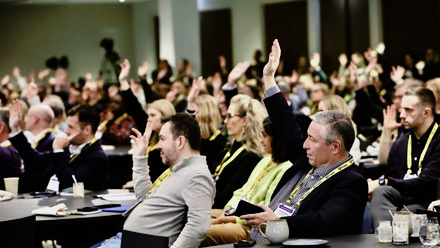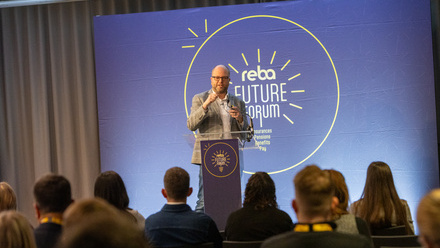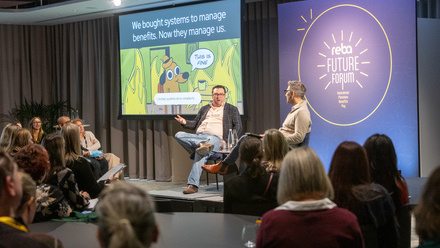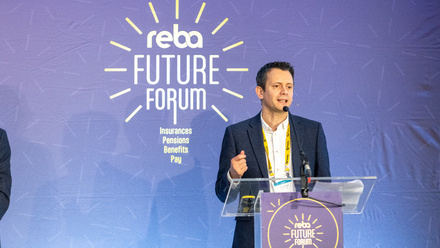Seven HR leaders share their predictions on the future of mental health at work
While this came with major setbacks, it also did a lot of good. We've put the theory that technology can free us from the restraints of distance into practice. We've seen mental health gain parity with physical health as a mainstream topic of discussion. We've finally gotten around to tidying out the kitchen cupboards.
Now as we prepare to return to work, leaders should weigh up the advantages and disadvantages that have been thrust upon us before leaping into a new transition. Never before have we been in a position to define a new normal – and it doesn't have to be exactly like the old one.
We asked our community of wellbeing leaders their views on the future of workplace mental health in the months and years to come.
What can wellbeing leaders learn from COVID-19, and how will this influence the future of mental health at work?
Stephanie Valles, benefits & wellbeing specialist, ASOS
The mental health agenda has been promoted more and more over the last few years, particularly in line with national awareness events, like Mental Health Awareness Week. However, COVID-19 has taught us the importance of managing our mental health, all of the time. When unforeseen events, such as COVID-19, are forced upon us, being resilient and able to cope and adapt to change physically and mentally is vital to the lives of our people and the success of our business.
Although COVID-19 has caused isolation, physically and mentally, having access to tools to support ourselves and each other has been enormously important, and proves a massive return on investment. Investment in mental health is clearly no longer a “nice to have”, so it will continue.
Joanna Bean, head of people, Thomsons Online Benefits
We can learn how our entire workforce can work remotely in our “new normal” and how this can be applied when we start to return to offices. I also appreciate that not everyone wants to be working from home so a balance will need to be applied – it’s about working with every individual as a human to find the flexible working balance that suits them.
Mental health will be improved if we can maintain the right balance to facilitate people working from home when it suits and also working at times that suit – a day’s work doesn’t have to mean 9 till 5! Less pressure on people to conform to the “old normal” can only be good!
Elle Hopkins, director of international total rewards, Medallia
The wellbeing community as a whole is seeing proof of just how important human connection is – it's something most of us are quite good at anyway, but the CVOID-19 crisis has shown the value of the hive mind. I also hope that more business leaders are realising the value that a strong wellbeing strategy brings. Many rewards and HR leaders are seeing their hard won wellbeing agendas validated at present!
Long term, the mental health provision of platforms such as Unmind, and strong support networks for employees, will become as commonplace as life insurance as employers see the importance of supporting mental wellness. Traditional EAPs will need to transform from being an ‘emergency’ service, to something more proactive in this new era of work.
Hayley Whitwood, people director, Arm
Tonnes and tonnes to learn here – the pandemic will define new purposes for the office that will stretch much further beyond their physical uses. They will be recognised more as places of connection and social importance beyond how they have been viewed previously. For those of us in global businesses, we will feel more connected to colleagues who are not co-located with us. We have found that the inclusiveness of meetings is heightened when everyone is in a different location.
In terms of the mental health agenda, this situation will have tested even those of us who would identify on the thriving end of the mental health spectrum. And so my hope is that this situation will make big steps in terms of people's understanding of how everyone is susceptible to a low period in relation to their mental health, and the ways that we can proactively and preventatively keep our minds healthy, whatever else seems to be out of our control.
Vanessa Sallows, claims & governance director, Legal & General
Even in a remote working environment, you can still ensure that the team culture, framework and support remains in place. It’s vital that the vision, direction, inspiration and motivation remain and that you continue to lead. Awareness of mental health in the workplace has been increasing, and now more so than ever with people feeling isolated, worried, scared and not in control of their circumstances. As such, it’s vital that organisations understand the root cause of their people’s “stress” and mental health concerns so that a holistic proactive wellbeing strategy and support can be put in place to enable people to thrive within the workplace.
Ed Airey, group reward director, William Hill
I have seen so many good things happening in our company and outside – much bigger focus on wellbeing, more regular team catch-ups and (online!) socialising, but the biggest thing has been the attitude to working from home and better respecting the different roles that people have in life (colleague, parent, partner, family member, friend etc) and enabling those roles to work with much less friction.
So the main lesson is to remember and keep these going when things get easier and keep applying them – great as many mental wellbeing tools are, one of the biggest helps is easing some of the underlying causes of poor mental health.
The best companies have seen engagement increase during this crisis and this should be a massive lesson.
Kelly O'Neill, head of coaching & wellbeing, Simply Business
COVID-19 has accelerated the wellbeing agenda for us. We were already progressive in this area, however lockdown has amplified the issue and leaders are directly seeing the impact of poor mental health on engagement, productivity and happiness – and I don't think we're alone in this. Building on this new knowledge and awareness will be imperative to keep mental health high up on the agenda beyond the crisis.
When all this is 'over' I'm confident that employers will have a greater appreciation of wellbeing and the work to destigmatise mental health and invest in preventive and supportive tools will continue with greater momentum.
This article is provided by Unmind.
Supplied by REBA Associate Member, Unmind
Our vision is to create a world where mental health is universally understood, nurtured&celebrated.







